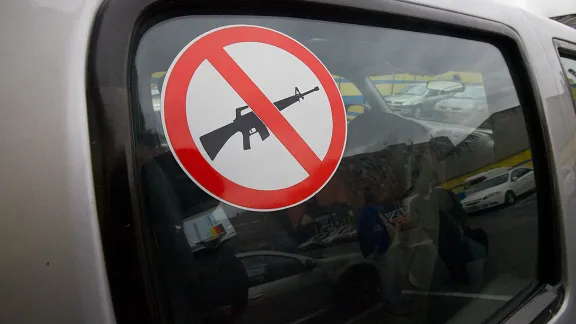
A sticker advises that weapons are not carried in the vehicle. Photo: ACT Alliance
LWF welcomes conclusion of peace negotiations in Colombia
(LWI) - The Lutheran World Federation (LWF) expresses its joy over the announcement of a successful conclusion of the peace negotiations in Colombia. On 25 August, the Colombian government and the country’s largest guerilla group, the Revolutionary Armed Forces of Colombia (FARC) announced a peace agreement to end 52 years of civil war.
Vital points in the agreement are land reform and access to land, as land rights are seen as the initial cause of the guerilla war. Other important points are political participation, demilitarization and a change of the government in its approach to the drug trade. The ceasefire which was already announced in June has been hoding. The agreement needs to be approved in a public referendum on 2 October 2016.
“It is good to turn towards peace,” LWF General Secretary Rev. Dr Martin Junge said, as he called on Colombians to “cherish the vision of a lasting peace in Colombia and leave the nightmare of violence behind. We offer our prayers and support as the Colombian people move from conflict to embrace peace and justice as a way of envisioning their country.”
Supporting the peace process
The Evangelical Lutheran Church of Colombia (IELCO), an LWF member church, and the LWF World Service Colombia program have been supporting the peace process in the Latin American country in various forms. LWF is working with the Permanent Committee for the Defense of Human Rights-PCHR East Region on the project "Building Pathways of Peace in our Territory”, alongside those working on the Interchurch Dialogue for Peace (DiPAZ). The initiative seeks to involve local people both in defending rights – which requires courage and determination – and in peace building activities which encourage trust, such as academic and recreational projects.
The conversation stage has ended and now we prepare for the implementation of the accords; a time where we seek the fullness of life, where the table is served and shared with all from every region and territory in Colombia; no exceptions, no discrimination, no violations of rights, no repeat victims, no more attacks on our shared home, gift of gifts, our mother earth. Because of this we are filled with hope.
“The time to transform our weapons into instruments of peace has arrived!”, DiPAZ announces at the conclusion of the peace talks, citing the Prophet Isaiah (2,4).
“The conversation stage has ended and ahead is the implementation of the accords; a time where we seek the fullness of life, where the table is served and shared with all from every region and territory in Colombia.” We say “yes” to the peace agreement and we are filled with hope, the statement concludes.
In July 2015, the LWF together with more than 130 ecumenical and faith-based organizations signed an appeal to the main negotiators of the peace talks in Havana, calling for a bilateral ceasefire between the government forces and the FARC guerilla.
End to decades of war
The Colombian civil war is the last guerilla conflict in the Latin American region. The main parties of the conflict are Colombian government forces and several guerilla groups. In 2012, peace talks started in Havana, Cuba, between the Colombian government and the largest guerilla group, the Revolutionary Armed Forces of Colombia (FARC). The ELN (Ejército de Liberación Nacional – National Liberation Army), an equally large guerilla army with a slightly different ideological approach, joined the peace talks in spring this year.
The agreement is meant to end a conflict in which more than 200,000 people have been killed. Another 15,000 people are missing. The guerilla warfare displaced millions. Frequent sabotage activities have left hundreds of thousands without clean water and electricity. The majority of those killed or displaced are civilians. Much of the conflict has been financed through ransom for abductions and the drug trade.
As the country hopes to enter a new phase, LWF World Service is engaging by working for ‘peace, land, and dignity for all’ As part of working towards a peace which is just and fair for the most vulnerable, the rural population receives training on human rights, land rights and international law. In this way they can ensure that land is restored to vulnerable communities so that they can rebuild their lives and their livelihoods.


